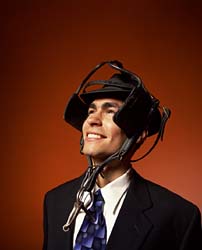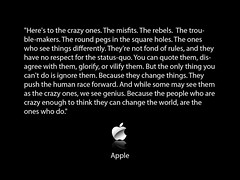DC Library Planning and Listening Session: A Bit on Last Night
 A person wearing the blinders that are normally applied to a horse.
A person wearing the blinders that are normally applied to a horse.In advance of last night's session, I read through the Library System Summary Report, and I don't think the report is terrible. I think it's maybe 25% of the way there. There are a lot of gaps, while there are some creative ideas, there could be a lot more. I will end up writing 15 pages (or more) in response, but it's the necessary and right thing to do.
More people need to step up and write similarly detailed critiques and suggestions.
One of the biggest problems with the whole way the "listening sessions" are set up is that while every participant gets to speak in the context of small groups, what people "get" to talk about is very circumscribed, limited to the four broad questions for which the Library Planning Task Force is seeking guidance.
This is a real problem with the "deliberative" processes proscribed by public participation consulting firms like AmericaSpeaks. Everyone speaks, but in such a format what citizens get to speak about is constrained. This is a tyranny of process and it creates a false consensus, and it rarely allows for or encourages creative thinking. This is a problem, generally, in the way public participation processes are set up for citizen planning efforts. Too often it puts the patina of participation of an already "signed, sealed, and delivered" process.
Well, that didn't happen last night.
Jennifer Ellingston, an old progressive, and someone who honorably entered the ring against Sharon Ambrose in the 2002 election as a candidate for the Statehood Green Party was the first to speak up, after it was explained to us how the meeting would run.
She said that was fine and good, but that we needed time to speak to members of the Task Force, about our concerns, without being circumscribed by their format. Myself, and maybe 4 other people agreed, and to the organizers credit, including president of the Library Board John Hill (pilloried from time to time in this blog as the executive director of the pro-business lobby, the Federal City Council), they agreed to this change in format.
I don't have my notes with me, but some people said some important things that would not have been said had we acquiesced to their preferred format.
-- People mentioned that libraries are the place for learning for everybody.
-- That mathematical and technical literacy, not just being able to use a computer, is important. -- That the system is vastly underfunded (note that, people who are proud of DC's budget "surplus" which is derived from the systematic underfunding of a variety of agencies).
-- That there are far more creative partnerships that could be developed to broaden information services far beyond what other jurisdictions are doing anywhere else.
-- People disagreed, but laid out good arguments, pro and con about the current MLK Central Library.
-- As well as whether or not to develop libraries as part of mixed-use developments.
-- A recent college graduate talked about the comfortability of college libraries or even Barnes and Noble, compared to the MLK library.
-- that the library system should focus on open source software applications and a platform to allow for more creativity and reduced costs (of course, that might interfere with Gates Library Foundation donations...)
Etc.
 The MLK Central Library, Washington DC. Washington Post photo. If the difficulty of using this library isn't a slam against modernist architecture, I don't know what is.
The MLK Central Library, Washington DC. Washington Post photo. If the difficulty of using this library isn't a slam against modernist architecture, I don't know what is.Here is the list of the rest of the schedule of the Library Task Force listening sessions, I suggest you go to one or more of the sessions, and make the format more to your liking, and generate better results for your neighborhood and for your city:
-- Saturday, February 11, 12:30 p.m., Petworth (Ward 4), 4200 Kansas Avenue, NW, 541-6300;
-- Wednesday, February 15, 6:30 p.m., Georgetown (Ward 2), 3260 R Street, NW, 282-0220;
-- Tuesday, February 21, 6:30 p.m., Mt. Pleasant (Ward 1), 3160 16th Street, NW, 671-0200;
-- Saturday, February 25, 12:30 p.m., Northeast (Ward 6), 330 7th Street, NE, 698-3320;
-- Monday, February 27, 6:30 p.m., Francis A. Gregory (Ward 7), 3660 Alabama Avenue, SE, 645-4297.
(Each session is listed in the calendar in the right sidebar as well.)
Also see some of these previous blog entries:
-- Library Planning Redux
-- John Hill, DC's new "Reading Teacher"?
-- DC Library Planning Part ?
-- Central Library Planning efforts and the City Museum, how about some learning from Augusta, Maine ... and Baltimore?
-- Citizen's Summit and libraries
-- More learning from Los Angeles -- "LA Renews Its Libraries as Modern Civic Centers"
 Still, it's not easy to "think different," because organizations aren't looking for excellence, as pointed out in this interview with Robert Quinn, entitled "Change: It's a Matter of Life or Slow Death."
Still, it's not easy to "think different," because organizations aren't looking for excellence, as pointed out in this interview with Robert Quinn, entitled "Change: It's a Matter of Life or Slow Death."Index Keywords: civic-engagement; libraries



0 Comments:
Post a Comment
<< Home